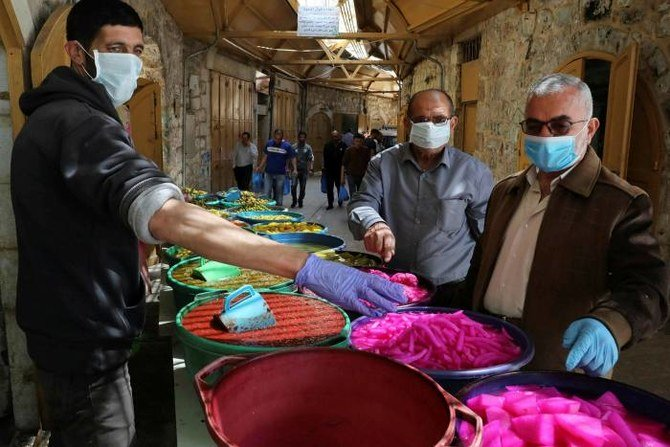
- ARAB NEWS
- 29 Apr 2024

Hazem Balousha
GAZA CITY: When asked about past Ramadans, Azeezah Nasrallah — with one of the most famous songs of the late Egyptian singer Umm Kulthum playing in the background — answered: “Let the old days come back.”
“There is nothing more beautiful than the old days, especially in the blessed month of Ramadan where goodness, blessing and peace of mind are concerned,” she said.
Nasrallah, 80, remembers the details of her life and childhood in her village Sarafand Al-Amar before the displacement of her family during the Nakba in 1948.
She was an eight-year-old girl at the time of the Nakba, whose 72nd anniversary coincides with the middle of Ramadan this year.
“The month of Ramadan was one of the most beautiful months of the year, and we were waiting for it with great happiness, especially the children . . . The atmosphere was different, and life was simple and people were good,” Nasrallah said.
She remembers how people used to prepare — a few days before Ramadan — pottery jars for water, and they made cheese by hand for suhoor meals. The well-off in the village provided the poor with flour, lentils, beans and vegetables, and paid zakat on their money on the first day of Ramadan so that the beneficiaries could buy what they needed for the holy month.
Nasrallah remembered how women gathered to prepare the iftar table, and people were loving and sympathetic, and keen to distribute and exchange food among themselves.
She preferred the dish of “jrisha” (crushed wheat cooked with meat), and it was frequently cooked and prepared in Ramadan, and made by well-to-do families and distributed among relatives and neighbors.
The village of Sarafand Al-Ammar was not large, but the “blessing was great,” and the people were friendly, united by happy and sad occasions, as if they were one family, according to Nasrallah.
Less than 2,000 people were living there at the time of the Nakba, and there was only one small mosque, whose muezzin barely covered the area of the town.
She said: “We used to gather all the children of the village, both boys and girls, near the mosque, the time for iftar, and as soon as we heard the call to prayer, we set out cheering, chanting loudly on the streets and between alleys, and in this way many knew the time for iftar, while a few used to have a radio to know the timing and hear news.”
“Banquets for men and the iftar gatherings in Ramadan were held in the family diwan, and they sat for the sun until the evening prayer and taraweeh prayers, and after that they watched the religious tawasheeh, but people did not stay awake until dawn like the current generation does . . . stay up at night and sleep all day,” she said.
Despite the pain and suffering after Nakba, life remained simple and the people familiar, but with the passage of years, conditions and customs changed, even the joy of the arrival of Ramadan was not the same as it was in the past.
Ahmed, 58, the eldest son of Nasrallah, supports his mother’s view. “As the years pass, we lose many beautiful customs and traditions, as if they are a curse of development and technology,” he said.
“We have come to miss the family’s gathering and simple evenings that have been replaced by video games, series and movies that are packed with satellite TV during Ramadan.”
“Nothing like the old days, even health has regressed, food and drink are no longer healthy, and speed has become a feature of the times, and has lost its pleasure,” he said.
“We were young and our greatest dreams during Ramadan were to make a handmade lantern to light with candles, and we gathered all the children of the camp as we roamed the streets and alleys, we cheered and grew up rejoicing in Ramadan.”
“Today we miss the gatherings of children and their simple games during Ramadan, and even lanterns come to us from China — attractive but without spirit — and the mosques are many, but religious and behavioral values have declined a lot, and Ramadan has shifted from religious rituals to shows,” he said.